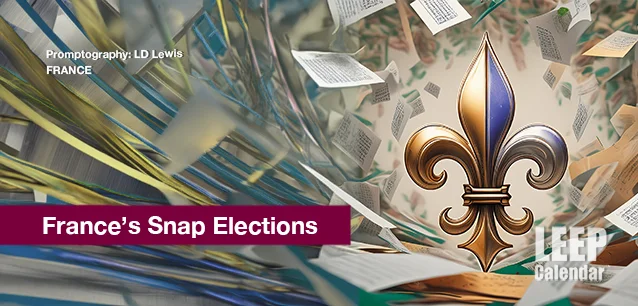 AD
AD
Today is: October 25
Scroll to explore events active on this date.
LEEP INK FEATURES

August? Absolutely!
In August, we live through the Dog Days of Summer. It's hot and often humid, and those who can leave for better climates do. Down south, winter is in full force. August is also known as "the ...

In The Heat of July: July 2025 Events
Is it hot enough (or cold enough if you're below the equator) for you yet? There is actually a day for that! Like every month, I pick a diverse collection of events you may or may not know about. This ...

May Blooms: Events in May 2025
Along with October, May is one of the most densely packed months of the year. It's before the summer humidity and the last whole month of the school year. The weather is warming in t...
About France's Snap Elections in 2024
European Countries
Ends: Jun 30, 2024
DESCRIPTION:
FRANCE'S SNAP ELECTIONS IN 2024
After stunning gains for far-right parties in the June 2024 European Union Elections, France's President Emmanuel Macron declared a snap election that could reshape the country's political landscape. Domestically, Macron faces mounting pressure from a restless electorate and a fragmented parliament. He hopes to secure a stronger mandate to address pressing national issues by calling for snap elections.GENERAL VS SNAP ELECTIONS IN FRANCE
In France, the difference between a snap election and a general election lies primarily in their timing and the circumstances under which they are called.
WHAT IS A GENERAL ELECTION?
General elections in France. The National Assembly, the lower house of Parliament, is elected every five years. The dates are predetermined unless extraordinary circumstances arise. They are routine and part of the normal democratic process to elect members of the National Assembly, and sometimes the President, based on the electoral calendar. General Elections are planned, allowing parties and candidates to prepare campaigns well in advance.
WHAT IS A SNAP ELECTION?
Snap elections are called earlier than the scheduled date of the next general election. They are not part of the regular electoral cycle and are announced quickly. Snap elections generally occur in response to specific political situations, such as a loss of confidence in the government, a political deadlock, internal strife within the ruling party, or other urgent matters requiring a fresh mandate from the electorate. In France, the President can dissolve the National Assembly and call for snap elections to resolve a political crisis or gain a new mandate for significant policy changes.KEY DIFFERENCES
Timing and Predictability:
Preparation:
Political Context:WHY DID MACRON CALL FOR SNAP ELECTIONS?
The decision to call for snap elections stemmed from a combination of factors. President Macron's administration has struggled with legislative gridlock, making it challenging to pass critical reforms. Growing public dissatisfaction with economic policies, social inequality, and the handling of recent strikes and protests further weakened the government's position. Additionally, rising tensions within the coalition and defections from party ranks left the administration in a precarious situation, prompting Macron to seek a renewed mandate from the people.OVERVIEW OF FRANCE'S MAJOR POLITICAL PARTIES
Several key parties dominate France's political arena, each presenting distinct visions for the nation's future:
La République En Marche! (LREM):
Les Républicains (LR):
Rassemblement National (RN):
Parti Socialiste (PS):
La France Insoumise (LFI):
Europe Écologie Les Verts (EELV):FRANCE'S GOVERNMENT FORMAT
France operates under a semi-presidential system, blending elements of both presidential and parliamentary democracies. The President, elected by popular vote, is the head of state and has significant executive powers, including appointing the Prime Minister and the Cabinet. The Prime Minister, usually from the majority party or coalition in the National Assembly, acts as the head of government, responsible for domestic policy and administration.
The bicameral legislature comprises the National Assembly (lower house) and the Senate (upper house). Members of the National Assembly are elected by direct vote, while an electoral college chooses senators.WHAT IS AT STAKE IN FRANCE'S SNAP ELECTION?
June 30th's snap elections are a referendum on President Macron's leadership and a critical juncture for France's future direction. With economic recovery, climate change, immigration, and social equity at the forefront, the results will determine the country's policy trajectory and role within the European Union. The world will watch closely, aware that the outcome will have significant implications for France and the broader geopolitical landscape.
VIDEOS
SUPPORTING DOCUMENTS
Currently, this event does not have supporting documents.
ADDITIONAL IMAGES
Currently, this event does not have supporting images.
Where would you like to go now?
 AD
AD


/footer-logo.svg)
